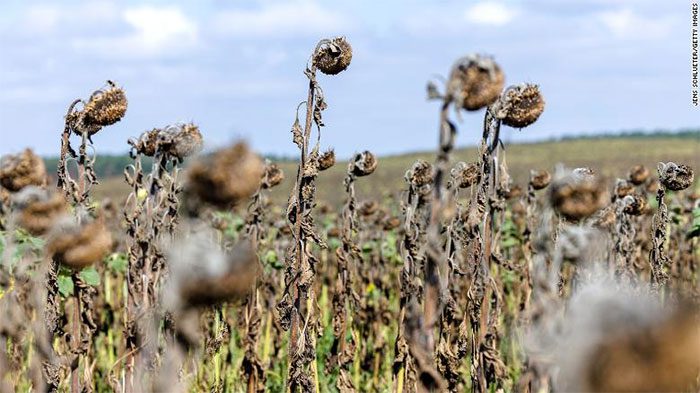A recent study indicates that ethanol—a compound found in beer and alcohol—can help plants survive drought conditions for at least two weeks without water.
According to research published in the journal Plant and Cell Physiology on August 25, scientists from the RIKEN Center for Sustainable Resource Science in Japan stated that providing ethanol to crops can protect them from dying due to drought. In fact, when plants are deprived of water, they naturally produce ethanol.

Drought is causing plants to wither in many parts of the world. (Photo: CNN).
“Scientists discovered this phenomenon while searching for compounds that help plants cope with stress,” said Motoaki Seki, the lead author of the study, in an interview with CNN.
This discovery is not only beneficial for gardening but also for farms growing essential crops such as rice and wheat. Drought-resistant staple crops could help alleviate food insecurity—a pressing issue affecting many regions worldwide, exacerbated by heatwaves, the Ukraine conflict, and supply chain disruptions.
Researchers pointed out that using ethanol is a practical and simple way to increase food production globally during droughts or water shortages.
To demonstrate their findings, researchers planted wheat and rice, regularly watering them, then added ethanol to the soil of one group of plants for three days. After that, they withheld water from both groups of plants for two weeks. The result showed that the plants in ethanol-treated soil survived better than the others. Approximately 75% of the wheat and rice plants that received ethanol survived after being watered again, while the survival rate for the group without ethanol was only 5%.
The scientists also discovered the mechanism by which ethanol protects crops. Using Arabidopsis—a small plant commonly used in experiments—the researchers found that specimens treated with ethanol during drought conditions retained water and heat by closing their stomata—the tiny openings on leaf surfaces. Plants in ethanol-rich soil activated this mechanism during drought, even before they were actually water-deprived.
However, the research team cautioned that ethanol needs to be used judiciously, as higher concentrations of ethanol can inhibit plant growth. In other words, this should not be tried at home.
Author Seki mentioned that he and his colleagues will soon begin testing ethanol on crops in real field conditions.


















































